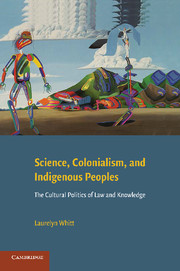Book contents
PART II - THE HUMAN GENOME DIVERSITY PROJECT: A CASE STUDY
Published online by Cambridge University Press: 04 August 2010
Summary
We move now to a case study which exemplifies the ideology of the new imperial science in practice, as well as the sustained attack upon it that is being mounted by indigenist critics of biocolonialism. In 1988, the Human Genome Organization (HUGO) began a massive multibillion dollar effort to map and sequence the human genome known as the Human Genome Project (HGP). Because the HGP did not consider population-level variation, population geneticists would suggest a collateral study. On the eve of the Columbus Quincentenary, several leading geneticists proposed the Human Genome Diversity Project (HGDP). In an article in Genomics entitled “Call for a Worldwide Survey of Human Genetic Diversity: A Vanishing Opportunity for the Human Genome Project,” they asserted: “The Human Genome Project can now grasp a vanishing opportunity to preserve the record of our genetic heritage … The genetic diversity of people now living harbors the clues to the evolution of our species, but the gate to preserve these clues is closing rapidly.” At an estimated cost of $25 million, the Diversity Project was formally brought under the auspices of HUGO in January 1994 when an international executive committee was formed to oversee HUGO's relations with the Project.
The stated goal of the HGDP, at least initially, was to collect, analyze, and preserve for future study DNA from diverse populations in order to understand human variation, and to learn more about human origins, evolution, and ancient migration patterns.
- Type
- Chapter
- Information
- Science, Colonialism, and Indigenous PeoplesThe Cultural Politics of Law and Knowledge, pp. 81 - 83Publisher: Cambridge University PressPrint publication year: 2009



